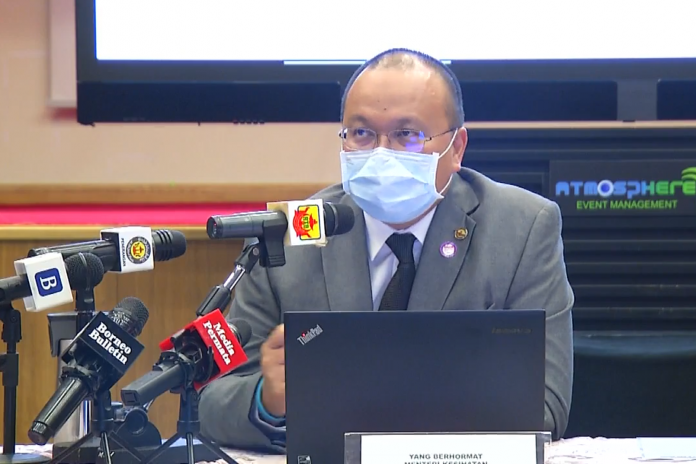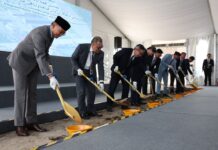Brunei has extended its partial lockdown until October 3 to help curb the ongoing second COVID-19 wave fueled by the Delta variant.
The extension was announced by the Minister of Health on September 2 at the COVID-19 press conference, with the country reporting 1,703 active cases and 12 deaths as of September 5.
The control measures were first announced on August 7 and 9 and while daily recoveries have exceeded new cases for the third consecutive day, substantial risk remains with only 23% of the population fully vaccinated.
House-to-house services involving physical contact not allowed
House-to-house services that involve close physical contact such as hair cutting and doing make up are not allowed under the current partial lockdown, said the Minister of Health on September 4 and 5.
YB Dato Seri Setia Dr Hj Mohammad Isham Hj Jaafar said that businesses or freelancers are not allowed to provide services that involve physical contact at customer’s homes even if they take precautions such as as wearing personal protective equipment (PPE).
The minister said that there is no method at present to ascertain if the PPE used is up to medical standards and if it is being reused by the vendor. He advised that people be patient and wait for control measures to ease before resuming these services.
“Make-up artists conduct their jobs in close contact with clients, even closer than a barber is to a customer. So to reduce the risk of infections, such services are not encouraged,” he said in response to a reporter’s question on whether such services are allowed.
“As we have seen from the video of people conducting home to home services. It shows a person arriving at the house in a jupiter suit, but we don’t know from which house he came from, or whether or not the suit was recycled – as it is quite expensive.”
Barbershops, salons and other health and beauty service establishments are currently prohibited from operating.
Contact tracing to decide whether businesses with positive cases are closed
Contact tracing conducted by the Ministry of Health (MoH) will decide if businesses with positive COVID-19 cases need to temporarily close.
Although several businesses have proactively ceased operations when COVID-19 cases are reported amongst their employees, some businesses have continued to operate, drawing ire and confusion documented in a viral WhatsApp message.
In response, MoH Minister YB Dato Dr Hj Mohd Isham said on September 3 that the closure of operations depends on the extent of the positive cases’ movement within the business’ premises and who they’ve interacted with.
Through BruHealth contact tracing and investigations by public health officials, close contacts of positive cases will be identified.
“A business will not be closed (just) because one person tests positive. We will review their Business Continuity Plan (BCP) and find out how they are going to contain the infection, such as cleaning where the infected individual rests,” he said.
Citing an example of when a business could continue to operate after an employee tests positive, the minister said that if there are 10 close contacts identified in a business with 200 employees, they will have to be separated and undergo testing. The areas where the infected cases visited will have to be cleaned. If there are no further positive tests, then this business can continue operating.
Citing The Mall as an example of a larger establishment required to close temporarily, the minister said that the initial positive case was a cleaner, who had operated throughout the establishment. “But once it is cleansed and the contacts are identified, we will allow it to re-open,” he said.
Using another example, the minister said that if a small business has three out of five workers infected, they will most likely have to close, especially if they are in close quarters.
Those awaiting their swab test results, have been identified as close contacts or have a BruHealth red code should not report to work physically.
Essential travel requires full vaccination
Residents leaving Brunei for essential travel must be fully vaccinated for COVID-19 two months before their flight date.
With first doses of the COVID-19 currently on hold for the general population due to a vaccine shortage, MoH Minister YB Dato Dr Hj Mohd Isham said the existing vaccine supply could be potentially utilised for those needing to travel urgently.
“We can look into it, but it depends on how urgent or important the business travel is as the vaccines are very limited at the moment and needs to be prioritised for those who really need them,” he said at the COVID-19 press conference on September 2.
The government is currently prioritizing their vaccine stock for those scheduled to receive their second dose, as well as for at-risk populations including the elderly, pregnant woman and people with different abilities.
Just over 50% of Brunei residents have received their first dose, with 23% having received both doses as of September 3. The government is targeting 70% of the population to be fully vaccinated by the year’s end.
As of September 2, 20 Brunei residents have received Vaccinated Travel Passes from the Singapore government to travel to the city state between September 8 and October 7. 18 are for short-term visits while the other two are long-term pass holders.
The passes are under Singapore’s new vaccinated travel lane, which voids the need for visitors to quarantine if they test negative for COVID-19. Brunei’s borders are still closed except for essential travel, requiring an application and government approval – as well as quarantine for those arriving.
The standard quarantine period after arriving to Brunei is 14 days, but may be reduced depending on the government’s assessment of the foreign country’s current risk-profile.
Members of the public are not allowed to pick up or greet passengers at the Brunei International Airport. Passengers must be dropped off at the departure terminal without accompanying persons said the Department of Civil Aviation (DCA) in a statement on August 29.
Those entering the airport must have BruHealth and scan the QR code upon entry. Those working at the airport without BruHealth must fill in a log book and show their employee ID. Passengers who cannot download BruHealth must also use the log book and submit proof of travel documentations including their negative COVID-19 test.












